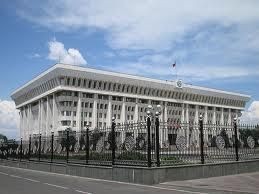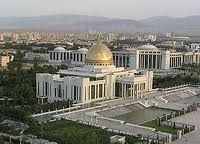BISHKEK (TCA) — The recent developments in Kyrgyzstan have shown that the power succession scheme designed by former President Atambayev has proven to be his mistake. We are republishing this article on the issue, written by Nurjamal Djanibekova, originally published by Eurasianet:
It was just half a year ago that Kyrgyzstan made history with its first peaceful handover of power from one elected president to another.
Before ending his single permitted six-year term, Almazbek Atambayev looked around for a friendly successor to anoint. The choice fell on Sooronbai Jeenbekov, a long-time associate. His loyal then-prime minister would surely be a dependable and even a malleable head of state as he continued to operate in the background, he must have thought.
After Jeenbekov made it through a scrappy election in one round in October, it all went sour. All thought of sharing power has gone straight out of the window. Since coming to office, Jeenbekov has fired all Atambayev’s top allies and prosecutors are now filing criminal cases against some of them.
How it all began
In the early days after the succession operation was successfully executed, Atambayev disappeared from the public eye. That interlude ended on March 31, when he embarked on a pugnacious return to the political arena at a congress of the ruling Social Democratic Party of Kyrgyzstan, or SDPK. He had formally severed links to the party while president, as required by law. But as Atambayev made clear after being reappointed leader by the SDPK nomenklatura, his return had been prompted by unhappiness over how Jeenbekov had been running the shop.
Atambayev grumbled in trademark manner about Jeenbekov’s criticism of anti-corruption reforms undertaken during his presidency. He then implied Jeenbekov was laying the grounds for clan rule by declining to pressure his brother, Asylbek, a former speaker of parliament and sitting MP, into giving up his seat.
Asylbek Jeenbekov is actually also a high-ranking member of the SDPK, so it did not go unnoticed that he was not invited to the party congress.
President Jeenbekov took the high road and disdained to respond publicly to Atambayev’s inferences. His answer came in the days and weeks that followed.
From ally to opponent
One by one, all Atambayev’s allies have been kicked out of office. On April 7, the deputy head of the State Committee for National Security, or GKNB, Bolot Suyumbayev, lost his job, becoming the first victim of a systematic purge.
Next came GKNB chief Abdil Segizbayev. And then General Prosecutor Indira Joldubayeva. And then the head of the customs service Kubanychbek Kulmatov. And most dramatic of all, former Prime Minister Sapar Isakov.
Isakov had to be squeezed out by a vote in parliament, which should on paper not have been easy. Atambayev’s SDPK, after all, holds the largest bloc in the 120-seat parliament, although more than 20 MPs short of an outright majority.
All the same, several SDPK MPs turned on Isakov. It was the first time in Kyrgyzstan’s history that the prime minister lost his job through a vote of no-confidence. On paper, Isakov does not even hold the nominal title of ex-prime minister. That should have been the ultimate humiliation, but worse was to come.
But how could a party whose leading membership had only recently backed Atambayev as its leader have so swiftly turned on the former president’s protégé and top holdover trump card?
Feliks Kulov, a former premier and member of parliament, said he believes the growing rift between Atambayev and Jeenbekov has created a schism within the party too. The former president has been dealing with strictly organizational party affairs, while Jeenbekov has managed to capture the SDPK’s parliamentary wing.
“You can see it clearly that the majority of the faction in parliament is supporting the new president, although with some issues they are having to grin and bear it. It has to be said that the center of decision-making now lies with Jeenbekov,” Kulov told Eurasianet.
Criminal probes
Things have in recent days taken an even more serious turn as investigators have begun pursuing criminal probes against a couple of top Atambayev allies over major projects that were touted as the ex-president’s pride and joy.
Isakov is feeling the brunt of it. On May 29, the GKNB revealed it is charging him with using his position as a senior presidential administration adviser, in 2013, to sway the process through which a Chinese company was granted a $386 million contract to modernize a power plant in the capital, Bishkek. The security services say the deal was doled out without a tender, in large part through Isakov’s connivance, and that project costs were artificially inflated.
The normally unflappable Isakov, who has been ordered to refrain from travel pending investigations, appeared stunned by the charges.
“They are creating a hype around this person and making him out to be a criminal,” he told reporters, referring to himself in the third person. “My lawyers and I will now work closely on proving my innocence. I am in shock.”
Isakov is exasperated by the accusations being laid at his feet. He said that the power plant contract was handed to TBEA, the Chinese company, as a specific condition for China granting the credit with which to do the work in the first place. It was, essentially, TBEA or nothing, he argues.
Undeterred by such protestations, investigators are now identifying Isakov as the moving force behind the increasingly scandal-ridden $22 million reconstruction of the State History Museum in Bishkek and the building of a $20 million hippodrome for the upcoming Nomad Games. Both projects were started without clear plans and costs are getting out of hand, according to investigators.
Previously, on May 21, the GKNB announced it was charging Kulmatov, the former customs chief, with corruption while serving as mayor of Bishkek, an office he held for two years, up to February 2016. He is accused of redirecting $2 million that had been provided as part of the Chinese power plant loan onto the accounts of the mayor’s office. His office is then said to have used the money to grant a construction contract for a school in a shanty neighborhood on the fringes of Bishkek without going through the process of a tender.
Kulmatov has mocked the idea that building a school could constitute criminal conduct.
“You don’t even need to look for a subtext here. The matter is clear and it seems that I was not to the pleasing [of the new government],” he told reporters.
Kulov, the former premier, meanwhile, allows that these probes may be more about finally tackling high-level corruption than a political witch-hunt as such.
“The public is raising these issues and Jeenbekov is simply not covering up the doings of Atambayev’s associates. And at the same time, he is not using Atambayev’s methods. He is not artificially ratcheting up tension, he is not manipulating public broadcasters to pour dirt on people. In this respect, he is behaving himself quite civilly,” he said.
Atambayev next?
For the time being, Atambayev is protected by the status of immunity afforded to ex-heads of state. But that may not last long.
Emboldened by the change of background music, parliamentarians on May 17 made initial moves toward revoking that immunity. Iskhak Masaliyev, the MP who first made the proposal, said he was motivated by irritation at the fact that Atambayev cannot even be questioned as a witness in the ongoing investigation over the power plant project. In a vote that must have startled the former president, 87 MPs present in parliament voted to approve the motion to discuss stripping his immunity. Only 14 opposed. Many of the supporters of the initiative were from the SDPK.
Political analyst Marat Kazakpayev told Eurasianet that he believes this situation will force Atambayev to succumb to negotiations with Jeenbekov.
“Now there are two centers of decision-making. One is in the hands of the president, who holds the reins of power, say what you might. The other is under Atambayev, who still has a few cadres in the power structures. But if it continues like this, Atambayev will lose. He needs to take the initiative and reach an agreement with the president,” Kazakpayev said.
The right to party
Atambayev’s other potential get-out strategy is to return to more active politicking by mobilizing that section of the SDPK that is still loyal to him for the 2020 parliamentary elections.
The north-south dimension of Kyrgyz politics, however, poses problems on that front. The master stroke of Atambayev’s time in office was that he avoided the mistake made by two deposed ex-presidents, of consolidating too much influence in their regional base. Kurmanbek Bakiyev, for example, who was overthrown in a bloody uprising in April 2010, was opposed by a northern alliance bent on displacing his clannish, southerner-based rule.
Atambayev is a northerner and Jeenbekov a southerner. Their appeal to those respective electorates and informal power groups situated in those respective regions made their front relatively unassailable. But Atambayev will no longer be able to count on the certainty of southern support for the SDPK. The party’s point-man for the south is Asylbek Jeenbekov, the president’s younger brother and the very person frozen out of the SDPK congress in March.
“[The younger Jeenbekov] has all the moral and political right to create his own party. He didn’t leave the SDPK, he was pushed out, and with no justification,” said Kulov. “And [he] did a pretty good job as speaker. There were no MPs who had anything against him. He was straight with everybody and they respected him for that.”
The emerging consensus among the commentariat is that Atambayev seriously misjudged his hand in returning to politics.
“He thought his political influence would remain intact, but that was not going to be possible without having any levers of influence. He should have just left with his conscience intact and not returned to politics,” Kazakpayev said.









